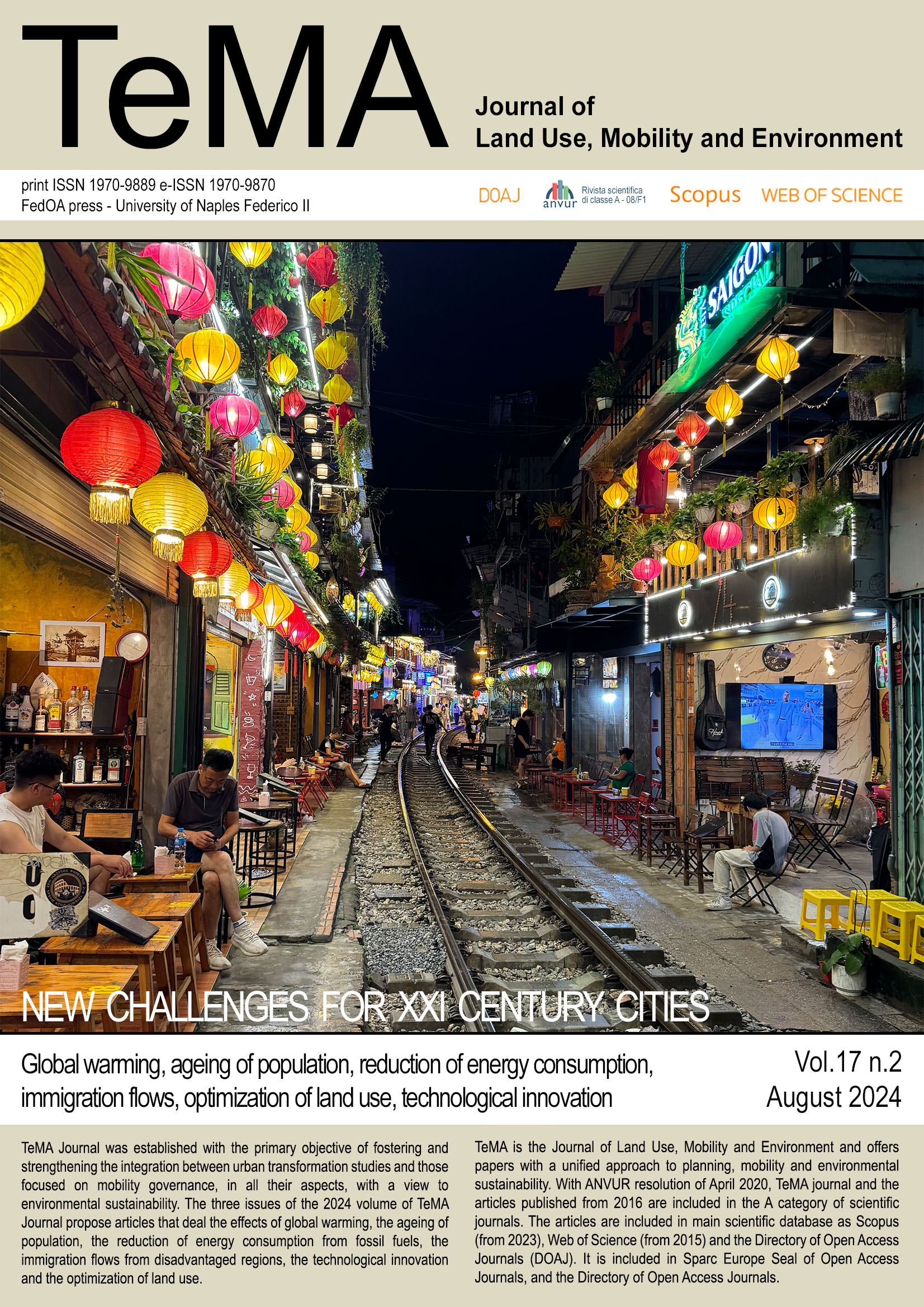Global warming or global warning? A review of urban practices for adaptation to extreme heat
Abstract
Starting from the relationship between urban planning and mobility management, TeMA has gradually expanded the view of the covered topics, always remaining in the groove of rigorous scientific in-depth analysis. This section of the Journal, Review Notes, is the expression of continuously updating emerging topics concerning relationships between urban planning, mobility and environment, through a collection of short scientific papers written by young researchers. The Review Notes are made of four parts. Each section examines a specific aspect of the broader information storage within the main interests of TeMA Journal. In particular, the Urban Practices section aims at presenting recent advancements on relevant topics that underline the challenges that the cities have to face. This note provides an overview of the challenges that global warming poses and the risks in terms of climate change that it generates for territories and cities, with a specific focus on the extreme heat phenomenon. The challenges that adaptation to exteme heat events commonly faces are outlined, and a brief review of international case studies is carried out. Finally, the results of the review are discussed highlighting some key threads of extreme heat events adaptation practices and three significant examples of adaptation in urban areas are reported, within a perspective of integration and sharing of know-how on the topic.
Downloads
References
AI for Resilient Cities: bringing together technology and community outreach for heat-health interventions in India - ClimaHealth. (2023, November 30). ClimaHealth. https://climahealth.info/resource-library/ai-for-resilient-cities-bringing-together-technology-and-community-outreach-for-heat-health-interventions-in-india/
Vetter, R., Heneghan, Y., Campbell, K., Miranda Morel, L. (2021). Urban Heat and Equity: Experiences from C40’s Cool Cities Network. C40 Cities Climate Leadership Group.
Copernicus: In 2024, the world experienced the warmest January on record. (2024, February 8th). Copernicus Climate Change Service. https://climate.copernicus.eu/copernicus-2024-world-experienced-warmest-january-record
Center for Climate Change ad Health. (2016). Extreme Heat, Climate Change and Health. https://climatehealthconnect.org/wp-content/uploads/2016/09/ExtremeHeat.pdf
Cybersecurity & Infrastructure Security Agency (CISA). (n.d.). Extreme Heat. CISA. https://www.cisa.gov/topics/critical-infrastructure-security-and-resilience/extreme-weather-and-climate-change/extreme-heat
Dinç, G. & Gül, A. (2021). Estimation of the future land cover using Corine Land Cover data. TeMA - Journal of Land Use, Mobility and Environment, 14 (2), 177-188. http://dx.doi.org/10.6092/1970-9870/7671
European Commission. (n.d.). Consequences of climate change. Climate Action. https://climate.ec.europa.eu/climate-change/consequences-climate-change_en
Eltahir, E. & Krol, A. (2022, June 23). Extreme Heat. MIT Climate Portal. https://climate.mit.edu/explainers/extreme-heat
European Environment Agency (2024). European Climate Risk Assessment: Executive Summary. In eea.europa.eu. Publications Office of the European Union. https://doi.org/10.2800/204249
Gaglione, F., & Ania, A. E. D. (2021). Resilience as an urban strategy: The role of green interventions in recovery plans. TeMA - Journal of Land Use, Mobility and Environment, 14 (2), 279-284. http://dx.doi.org/10.6092/1970-9870/8054
Global Heat Health Information Network. (2024, February 10). AI for Resilient Cities: bringing together technology and community outreach for heat-health interventions in India | Global Heat Health Information Network. Global Heat Health Information Network. https://ghhin.org/resources/ai-for-resilient-cities-bringing-together-technology-and-community-outreach-for-heat-health-interventions-in-india/
Isola, F., Lai, S., Leone, F. & Zoppi, C. (2024). Integrating climate change adaptation into municipal masterplans through Strategic Environmental Assessment. A case study concerning Sardinia. TeMA - Journal of Land Use, Mobility and Environment, SI 1(2024), 61-78. http://dx.doi.org/10.6093/1970- 9870/10438
Luber, G., & McGeehin, M. (2008). Climate change and extreme heat events. American Journal of Preventive Medicine, 35(5), 429–435. https://doi.org/10.1016/j.amepre.2008.08.021
Moraci, F., Bevilacqua, C. & Pizzimenti, P. (2024). Planning the Transition of Cities. Innovative research approaches and trajectories. TeMA - Journal of Land Use, Mobility and Environment, 17 (1), 109-127. http://dx.doi.org/10.6092/1970-9870/10430tema
NOAA’s National Weather Service. (n.d.). Weather related fatality and injury statistics. https://www.weather.gov/hazstat/
Palermo, A., Chieffallo, L. & Virgilio, S. (2024). Re-generate resilience to deal with climate change. A data driven pathway for a liveable, efficient and safe city. TeMA - Journal of Land Use, Mobility and Environment, Special Issue 1(2024) 11-28. http://dx.doi.org/10.6093/1970-9870/9969
Pennino, S. (2024). Global warming or global warning? A review of urban practices for climate change adaptation in Europe. TeMA – Journal of Land Use, Mobility and Environment, 17 (1), 169-177. http://dx.doi.org/10.6093/1970-9870/10784
Turek-Hankins, L. L., De Perez, E. C., Scarpa, G., Ruiz-Diaz, R., Shwerdtle, P. N., Joe, E. T., Galappaththi, E. K., French, E. M., Austin, S. E., Singh, C., Siña, M., Siders, A. R., Van Aalst, M. K., Templeman, S., Nunbogu, A. M., Berrang-Ford, L., Agrawal, T., & Mach, K. J. (2021). Climate change adaptation to extreme heat: A global systematic review of implemented action. Oxford Open Climate Change. https://doi.org/10.1093/oxfclm/kgab005
UNDP. (n.d.). Coping with Drought and Climate Change (CwDCC) in Mozambique. UNDP Climate Change Adaptation Portal. https://www.adaptation-undp.org/projects/coping-drought-and-climate-change-cwdcc-mozambique
UNFCCC. (n.d.). COPING WITH DROUGHT AND CLIMATE CHANGE, MOZAMBIQUE. UNFCCC Adaptation Knowledge Portal. https://www4.unfccc.int/sites/NWPStaging/Pages/item.aspx?ListItemId=23200&ListUrl=/sites/NWPStaging/Lists/MainDB&SearchId=86801ab1-b396-d2f8-2c74-f76687b61550
UNFCCC Adaption Knowledge Portal. (n.d.). https://www4.unfccc.int/sites/nwpstaging/Pages/Home.aspx
Urban Heat and Equity: Experiences from C40’s Cool Cities Network. (September 2021). C40 Knowledge Hub. https://www.c40knowledgehub.org/s/article/Urban-Heat-and-Equity-Experiences-from-C40s-Cool-Cities-Network?language=en_US
U.S. Environmental Protection Agency (EPA) & Centers for Disease Control and Prevention (CDC). (2016). Climate Change and Extreme Heat: What You Can Do to Prepare. EPA & CDC. https://www.epa.gov/sites/default/files/2016-10/documents/extreme-heat-guidebook.pdf
Copyright (c) 2024 TeMA - Journal of Land Use, Mobility and Environment

This work is licensed under a Creative Commons Attribution 4.0 International License.
Authors who publish in this journal agree to the following:
1. Authors retain the rights to their work and give in to the journal the right of first publication of the work simultaneously licensed under a Creative Commons License - Attribution that allows others to share the work indicating the authorship and the initial publication in this journal.
2. Authors can adhere to other agreements of non-exclusive license for the distribution of the published version of the work (ex. To deposit it in an institutional repository or to publish it in a monography), provided to indicate that the document was first published in this journal.
3. Authors can distribute their work online (ex. In institutional repositories or in their website) prior to and during the submission process, as it can lead to productive exchanges and it can increase the quotations of the published work (See The Effect of Open Access)

